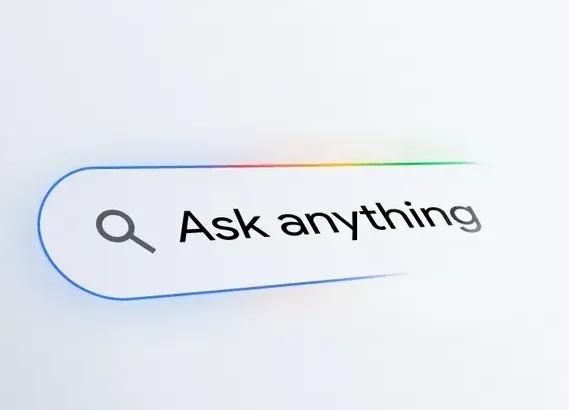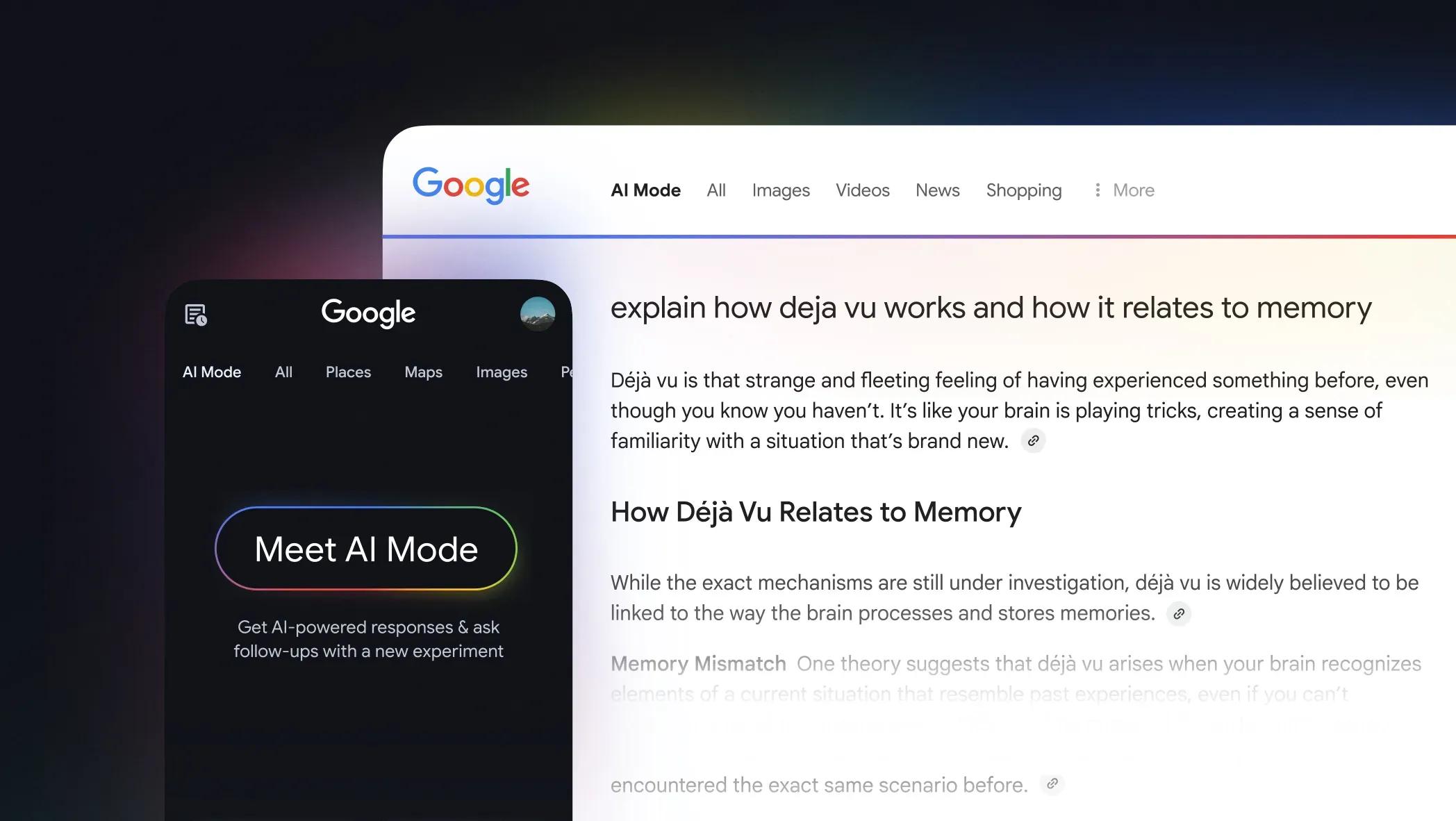Google’s Restructure & Pivot Into AI - What Does The Future Hold For Your Business?

Google just made the biggest change to search in 20+ years, and most businesses are still asleep.
Last month, Google held their annual keynote. An event where the company showcases where it’s at and where it’s going.
Google isn’t just a tech giant. It’s the infrastructure behind millions of commercial decisions every day.
From "best electrician near me" to "how do I bake a chocolate cake?". Google’s algorithm quietly steers what people buy, who they trust, and which businesses thrive throughout the year.
For many small businesses, Google is your oxygen. But that air quality is about to change dramatically.
Google’s pivot into AI isn’t just another gimmick; it’s a full-on restructuring of how information is found, prioritised, and delivered.
If you’re a business that’s relying on Google for leads, you’ll want to read up and take note. In this article, I’m going to go over:
- Why Google is pivoting fast into AI
- Changes to Google's advertising placements
- Best practices for integrating your website into AI overviews & answers
- The consequences of Google’s restructuring on your business’s visibility & revenue
- What Google's pivot into AI will have on market sophistication and competitive density
- Strategies and best practices to stay ahead of the curve and future-proof your business
- + heaps more goodies...

Google’s not adapting to AI - it’s trying to own it
For over two decades, Google has been the go-to platform for finding what matters most. From cafes to cultural museums and everything in between.
Unfortunately, like all good things, they must come to an end.
ChatGPT & similar AI agents like Claude & Perplexity have disrupted Google's business model.
These tools proved that people don’t want 10 blue links. They want the answer delivered to them. But… they don’t just want the answer, they want context and reasoning behind it.

Note
• Old way of doing search: query → list of links
• New way of searching: question → synthesised, personalised answer based on search history and browsing data
This shift is profound. It’s the first time in over 25 years that Google’s monopoly is threatened.
This isn’t as much about technology; the bigger picture is really about how humans interact with knowledge, and how data is filtered down and delivered.
“AI Mode” is Google’s response to this evolution.
What is AI Mode?
Ai mode doesn’t just help you find information, it delivers it directly. It’s like having Chat GPT in your Google search browser.

AI mode is like having a conversation; you can ask questions and have follow-ups in real-time. Traditional Google search was about typing in keywords and going to external links to find answers.
Google's AI Gemini will go through that process for you, scanning information on website and forming a custom response.
As a result, it will remove the need to go to external websites to flesh out the information
"AI Mode helps you search more effortlessly by combining the advanced capabilities of Gemini 2.0 with Google’s best-in-class information systems."
Robby Stein (VP of Product, Google Search)

Note
Wars and fought and won by holding attention. Google knows this better than anyone.
If Google can deliver the answer faster, better, and make it more personalised than anyone else, they keep the attention + hold onto the advertising revenue
This isn’t some Silicon Valley side project. It’s the future of search.
If your business relies on Google traffic in any form, SEO, Google Ads, Maps, or YouTube, this pivot directly affects your pipeline.
How do you stay ahead?
If you’re relying on Google, you’re going to have to be very intentional with your strategy (You already should be, but even more so).
You can’t afford to keep using outdated gimmicks from 2015. If you think of doing it yourself, don’t bother wasting your time, energy and money.
Ranking number one is going to be irrelevant if AI Mode skips past your link entirely.

Note
There is going to be even more opportunity in this AI age of search
The truth is, technology is moving way too fast. The majority of industries won’t adapt at the rate of technological advancement.
In the last 6 months, I’ve audited over 150+ businesses, and I’ve seen the strategies being deployed by other agencies.
I can honestly tell you 99% are irrelevant.
What you need to do in 2025 and beyond:
- Create a brand
- Include NLP keywords in your content
- Backlinks from highly trusted, relevant sources
- Create people-first content that matches search intent
- A website that is indexed and that can be crawled easily
- Elite-level page experience that’s fast, easy to navigate and aesthetic
- Multimodal content - Videos and images are paramount moving forward
- A comprehensive content strategy that internally links to relevant seed pages
- Anticipate query fan out and answer multiple questions AI will ask itself from the original query
- Be transparent about your process, pricing and everything else in between
If you're doing SEO the old way, you're falling behind
AI mode is a fundamental shift in how Google understands, processes, and delivers information.
In the next 2 years, agentic AI will be making recommendations and even booking services on behalf of users. This is the direction search is heading in. You, as a user, won’t have to dig through resources; Gemini will do it for you and present you with a list of options.
With a click of a button, you’ll be able to action your results.
All this without ever leaving the app.
Here are the top 5 factors you must include to show up in AI mode:
Intent over keywords (Search intent)
AI no longer matches exact phrases. It interprets what the user means.
Focus your content on solving real problems. Build pages around outcomes, not just phrases.
Synthesis over links (Page/content experience)
AI Mode pulls from multiple sources and creates a unified answer instantly. Make your content easy to extract from. Use subheadings, bullet points, clean formatting, and clear takeaways.
Trust over tricks (Backlinks + brand)
If your content lacks credibility, it won’t be shown. AI overviews and AI mode are pulling information from trusted websites.

Pro Tip
Content that’s statistical or analytical drives a lot of backlinks to your website. Journalists and trusted news sources always look for stats from subject matter experts in their fields
No BS (Relevant, people-first content that matches search intent)
AI Mode favours rich, useful, experience-backed content that delivers value and solves or answers a question.
You need to delve deeper into your content. Be hyper-specific. Layer insights, case studies, and subject matter expertise. Discuss topics that are relevant and exclusive to your experience.
Metadata & best practice SEO
The way AI mode delivers info won’t differ from the way the current algorithm delivers information.
Clean metadata, schema markup, and clear hierarchies.
Use schema for articles, FAQs, products, and reviews. Optimise headings, URL structure, and metadata for clarity.

Note
Traditional keywords like “Native landscape design in Northcote” will get used less.
Conversational queries like “who’s a local native landscape designer that I can use to transform my garden? I have a budget of $30-$50K?” will become the new normal.
Focus on the fundamentals to stay relevant and abundant
To make the right plays, you need to be playing the right games.
Rankings alone CANNOT be the core focus of your strategy; moving forward, it’s all about:
- Being a trusted brand & authority
- Being omnipresent
How do you become a trusted brand & authority?
Here are 10 fundamental principles that will make you stand out from your competitors and help you become the go-to in your industry:
1. Clean, professional website & seamless user experience
- First impressions matter; if your site looks like it was built in 2010, trust evaporates. Just having a nice website will put you above the majority of your competition; the bar is low
- Ensure fast load speed, mobile responsiveness, accessibility, and intuitive navigation
- Every touchpoint should feel frictionless, clear, and conversion-driven
2. Strong backlink profile from authoritative domains
- Prioritise links from high-authority domains, niche-relevant sites, and editorial mentions
- Use digital PR, thought leadership, and strategic partnerships to earn backlinks organically
3. Consistent, clear, and premium branding
- Logo, colours, fonts, tone, everything should feel cohesive and elevated
- Brand presence should signal “we’re not amateurs” at every level
- This includes social media profiles, GMB, email footers, and even lead magnet design
4. Front-facing founder or team
- People trust people, not faceless businesses
- Have the owner, founder, or key figures present in photos, videos, podcasts, and bios
- Show up in content, explain your methodology, share your story, build with connection in mind
5. Content that educates, nurtures, and demonstrates insight
- Likes ain’t cash - don’t write content for engagement
- Move beyond “blogging for SEO.”
- Create content that:
- Answers your ICP’s real questions
- Breaks down big ideas with clarity
- Provides proof, perspective, and process
- Use your unique experience and insight. Your clients are telling you what you want day to day. Pay attention
- Use frameworks, visuals, and storytelling to make your expertise memorable
6. Third-party validation (social proof)
- Client testimonials, reviews, video case studies, and logos of brands you've worked with
- AI and human users both look for signals of trust, such as showing that others vouch for you
- Bonus: Include rich review schema on-site to increase visibility in SERPs
7. Topical authority & niche depth
- Cover your niche comprehensively, not just with a few generic service pages
- Create supporting content clusters around core topics to show you “own” the conversation
- AI Mode is more likely to trust experts who demonstrate depth
8. Schema markup & structured data
- Make your content machine-readable
- Use article, FAQ, review, localBusiness, person schema etc., where relevant
- Structured data boosts visibility and signals clarity to AI
9. Media features & mentions
- Aim to get quoted, published, or interviewed by known industry sites or local publications
- “As seen in...” credibility can go a long way in boosting authority, for both AI and people
10. Regular signals of activity & freshness
- A stagnant site feels like a dead brand
- Update your content, post regularly, refine your offer pages, refresh testimonials
- Google (and AI Mode) notices who’s staying active and who’s asleep at the wheel

Note
The digital landscape has become very complex to navigate
I wouldn’t recommend going at it alone. If you want to streamline success, work with a growth architect, flick the easy switch on
Play the long game. The number one thing keeping businesses (and entrepreneurs) small is a short-term thinking.
People who think in days or weeks get swept up in pointless endeavours.
OK…
So you have a good idea of what it takes to build up your brand & authority, let’s look at point number two…
Omnipresence

Note
Rome wasn’t built in a day. If you want to build an empire, think long term.
Be dangerously consistent over years + decades not hours and days.

Do NOT rely on one platform - Diversify...
Think of your online strategy like a game of Monopoly. The goal is to take up as much real estate as possible.
You want to do this in two ways:
Across the various platforms online (Digital real estate)
- Website
- SEO + GEO
- Paid media (Google ads + Meta ads)
In your prospect’s head (Attention & trust)
- Content that hits every stage of awareness
- High-quality video + photography
- Building trust through thought leadership & subject matter expertise
Currently, as it stands, the majority of markets are extremely saturated. This means lot’s of “buy my sh*t” marketing. With that comes high amounts of fear, uncertainty and doubt from prospects.
Fear and doubt will rise higher as AI integration takes place in a wider commercial sense.
Why are prospects so sceptical?
Prospects are holding on to their wallets for dear life, BUT only when it comes to strangers and businesses they don’t trust. When there’s trust and transparency large amounts are being transacted for goods and services.
3 reasons why consumer behaviour has shifted
Market Sophistication
High levels of fear, uncertainty and doubt come from market saturation.
This is a result of a low barrier to entry. Technology has made it easy to start a business. As a byproduct, there are a lot of bad actors trying to make fast money. This comes at the expense of good working-class people who don’t know any better.
Global Politics
You can’t separate consumer psychology from global uncertainty. The political landscape and what’s happening with global trends has a direct factor on markets. Trump in the US, tariff wars with China, Israel + Palestine and now Iran. Russia and Ukraine still fighting. You have all that happening, not to mention Crypto and disruptive technologies.
Covid
COVID didn’t just change health protocols; it reshaped society’s psyche.
It brought to the surface:
- Fake gurus
- Snake oil tactics
- Government incompetence
BUT, there’s something else that rarely gets spoken about…
Banks were throwing money at people, willy-nilly.
Even myself and my old housemate James got approved for a $1.5 million loan from NAB.
Interest rates hit rock bottom, people just kept taking money out of the bank.
It felt like “free money” until it didn’t. It’s kind of like when you’re at a party dancing, having a good time. Then, all of a sudden, the police abruptly switch the music off and flick the light on.
The interest rates shot up overnight and people’s wages didn’t rise to meet the level of debt they took on.
Now we’re living in a world where the cost of living has tripled, but incomes have stayed the same. Everyone’s over-leveraged. Everyone’s anxious.
Even the ones who look successful are juggling debt behind the scenes.
In this emotional climate, trust is fragile.
Buyers aren’t just sceptical, they’re traumatised.
Capture attention. Cement trust. Future-proof your business
An omnipresent strategy is the only thing delivering on that promise.
Let me explain…
The majority of businesses are playing checkers when the game is chess
Over the hundreds of audits and businesses I’ve worked with, 99% are heavily leaning on one platform to drive revenue.
This leaves you exposed and over-reliant.
A large majority of the time, businesses don’t even have a strategy in place. They’re just throwing things at the wall, taking prospects to a weak landing page and praying by the phone for that lead to come through.
We work with a lot of different verticals at Mesmerise.
I see the data firsthand. Businesses that utilise an omnipresent strategy are sweeping the prospects that have nothing substantial in place.
This means authenticity, transparency, and ideas are your biggest weapons. 99% of marketing agencies will parrot one another. Business owners who try to do it themselves will get lost and generate weak slop with no intent.
Omnipresent ecosystems are like compounding interest
An omnipresent strategy compounds over time. It ensures lead volume today, whilst building authority and assets that reduce cost per acquisition long term.
Business owners have a huge opportunity vehicle…
There’s almost nowhere else you can put in $1 and reliably get $6, $10, even $30 back. Not in property. Not in stocks. Maybe in crypto, but that’s a gamble.
What we’re talking about here is discernment.
It’s engineered. Strategic. Predictable.
State-of-the-art omnipresence isn’t just running ads, it’s infrastructure. Every asset you create compounds. Every touchpoint builds trust. And over time, you’re no longer hustling for attention… your brand becomes the one prospects default to.
The ROI doesn’t just stack, it snowballs. This is how you build leverage in your business, not just leads.
As market saturation matures and becomes more sophisticated, your marketing must evolve and become sophisticated as well.
